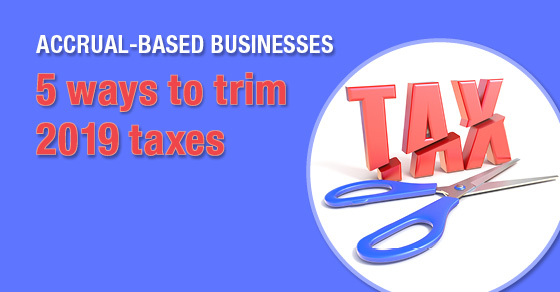When you read the word “mentor,” you might envision an older individual patiently and eloquently passing along decades’ worth of knowledge to a wide-eyed young student. Indeed, this is a kind of mentoring relationship that still exists and can prove beneficial to many organizations.
2 Valuable Year-End Tax-Saving Tools for Your Business

Posted by Marty Williams, CPA on Dec 11, 2019
At this time of year, many business owners ask if there’s anything they can do to save tax for the year. Under current tax law, there are two valuable depreciation-related tax breaks that may help your business reduce its 2019 tax liability. To benefit from these deductions, you must buy eligible machinery, equipment, furniture or other assets and place them into service by the end of the tax year. In other words, you can claim a full deduction for 2019 even if you acquire assets and place them in service during the last days of the year.
Posted in Business Tax
Holiday Parties and Gifts Can Help Show Your Appreciation and Provide Tax Breaks

Posted by Nick Wheeler, CPA on Dec 10, 2019
With Thanksgiving behind us, the holiday season is in full swing. At this time of year, your business may want to show its gratitude to employees and customers by giving them gifts or hosting holiday parties. It’s a good idea to understand the tax rules associated with these expenses. Are they tax deductible by your business and is the value taxable to the recipients?
Posted in Business Tax
The concept of “matching” is one of the basic principles of accrual-basis accounting. It requires companies to match expenses (efforts) with revenues (accomplishments) whenever it’s reasonable or practical to do so. This concept applies when companies make advance payments for expenses that will benefit more than one accounting period. Here are some questions small business owners and managers frequently ask about prepaying expenses.
Posted in Business Tax
The Art and Science of Goodwill Impairment Testing

Posted by Michael D. Machen, CPA, CVA on Dec 06, 2019
Goodwill shows up on a company’s balance sheet when the company has been acquired in a business combination. It represents what’s left over after the purchase price in a merger or acquisition is allocated to the company’s tangible assets, identifiable intangible assets and liabilities. Periodically, companies must test goodwill for “impairment” — that is, whether the carrying value on the balance sheet has fallen below its fair value. This assessment can be complicated.
Posted in Business Valuation
The Tax Implications If Your Business Engages in Environmental Cleanup

Posted by Lesley L. Price, CPA on Nov 20, 2019
If your company faces the need to “remediate” or clean up environmental contamination, the money you spend can be deductible on your tax return as ordinary and necessary business expenses. Of course, you want to claim the maximum immediate income tax benefits possible for the expenses you incur.
Posted in Business Tax
Change-in-control events — like merger and acquisition (M&A) transactions — don’t happen every day. If you’re currently in the market to merge with or buy a business, you might not be aware of updated financial reporting guidance that took effect in November 2014. The changes provide greater flexibility to post-M&A accounting.
Posted in Business Advisory
Posted in Business Tax
The use of so-called “profits interest” awards as a tool to attract and retain skilled workers has increased, as more companies are being structured as limited liability companies (LLCs), rather than as corporations. But accounting complexity has caused some private companies to shy away from these arrangements. Fortunately, relief from the Financial Accounting Standards Board (FASB) may be coming soon.
Posted in Audit & Assurance
It’s no surprise that 360-degree performance evaluations have grown in popularity. We live and work in an age of data — the more, the better, to avoid inaccurate assessments based on biases or small sample sizes.
Posted in Payroll, HR & Benefits





















